Are Sound Effects Really Necessary?
The Golden Age (the 1930s - 1960s), taught us a lot about sound effects. Artists such as Orson Welles and Jack Benny left behind a great compilation of techniques and developments that are even used by today’s sound effects artists in their own productions and works. When it comes to live performances, live and studio recording and even workshops, sound effects artists have at hand a diverse array of manual sound effects, as they seem to be highly fond controlling and playing these over electronic sampler keyboards that come with recordings. Of course, plenty of sound effects artists also use high-tech electronic samplers and other backing track devices depending on the nature of the project they’re currently working on; however, there seems to be a consensus regarding the unique style of manual sound effects.
In the past, manual effects were not the only option —some sounds were easier to produce and to obtain, like cars, planes and nature sounds; but when it comes to sounds product of the manipulation of an object, of course, a lot of that sound is how you manipulate the object in question. That being said, a lot of experimentation is required to get the right technique to produce the desired sound. A lot also falls under the umbrella of what experimentation often means —you need to test microphones and how the effect sounds over them. Always trust your ears if you’re just getting started.
Are sound effects really necessary?
Sound effects allow filmmakers and audiovisual project directors to tell a compelling a story. Think of a drama: a well-crafted sound, sound effects included, makes every story better, irrespective of whether it is full action, music, dialogues, etc. Sound effects are important, yes, but in comparison to other formats such as radio, where dialogue contributes practically 80% to the drama, music 10% and sound effects 10%, then they are not that pivotal. But if we’re talking about a sci-fi film, well, that’s another story —in film, sound effects add realism and, unlike radio, where if a sound effect has been misplaced no one will notice, the slightest mistake can cause a disaster.
Is sound really as key as video quality when producing visual projects?
As mentioned above, poor sound and poor sound effects can ruin any production regardless of its quality. Understanding that sounds, especially high quality sounds in movies and even video games are closely related to also understanding the true nature of a successful filmmaker or game developer. Think of all the times audio and sound, or the lack thereof, have made you rate, either positively or negatively, any project in particular. Additionally, think how both elements, audio, and sound, determines the reactions an audience is able to digest about the moving images or frames they are presented. So, are sound and sound effects important in films? It certainly is.
Sound in Film
Films are often produced using three different types of sound: human sounds (voices), music and, of course, sound effects. All of them interact with each other throughout the whole project and are crucial for films to provide audiences and viewers with the realistic aspect they expect to, subconsciously, recognize. As mentioned in earlier articles, dialogue and sounds must perfectly sync with the actions being projected —avoiding delays and, of course, being realistic. If a specific sound doesn’t match the moving image on the screen, the realistic effect is gone and the action itself is not believable at all.
There are several ways to achieve high-quality, realistic sounds, and that is by using original sound clips rather than uniquely resorting to sound libraries for the desired effect. Another way to provide an audiovisual project with realism is by incorporating the so-called asynchronous sound effects —which are often used as background sounds in films. These sounds, unlike the ones matching moving images, are not directly related to the action occurring in a moving image; they, of course, help a film be as realistic as it can and should be.
As for music, if you have ever asked yourself how important the implementation of music in film and audiovisual projects is, simply recall all the iconic film scores you’ve come across within the past —with all certainty, film music is perhaps one of the elements we remember the most about a film, and it’s one of the aspects that determines whether a film stands real chances of being successful or not. Movies like Steven Spielberg’s Jaws, and its iconic two-note melody, still brings back the memories of the big shark approaching its prey; what about George Lucas’s Star Wars? Years after the original trilogy was released, its musical score is still being used in today’s installments and is basically what builds up momentum during promotional affairs, and the list goes on and on. It’s practically impossible to simply overlook the importance of musical elements within today’s filmmaking.
*The images used on this post are taken from Pexels.com


